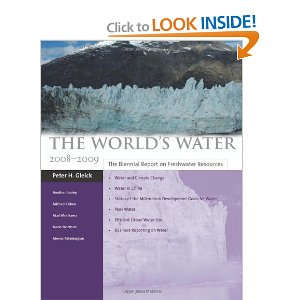
![]() Evolving Series, Multiple Authors, Deep Value
Evolving Series, Multiple Authors, Deep Value
August 26, 2010
Peter Glick, Heather Cooley, Michal J. Cohen, Mari Morikawa, Jason Morrison, and Meena Palaniappan
Although I continue to recommend The Atlas of Water, Second Edition: Mapping the World's Most Critical Resource as the best overall combination of content, visuals, and price, this book is a solid five stars and represents not just the current biennial report, but in the comprehensive index and tables of contents at the back, the volumes that preceded this one.
This is a multi-author work, and whiled Peter Glick is clearly the lead, other authors are Heather Cooley, Michal J. Cohen, Mari Morikawa, Jason Morrison, and Meena Palaniappan. I continue to be annoyed by Amazon's oblviousness to academic standards in relation to properly crediting authors, even when publishers correctly list them.
I am very glad to see that the publisher used Amazon's Look Inside the Book capability and strongly recommend studying the book through that route if you have any doubts. This is a fairly priced master work. It is not for the average reader, for that I continue to hold Marq de Villiers Water: The Fate of Our Most Precious Resource, but any of the following that I have reviewed or will be reviewing in the next few days are world-class:
The Evolution of the Law and Politics of Water
Governing Water: Contentious Transnational Politics and Global Institution Building (Global Environmental Accord: Strategies for Sustainability and Institutional Innovation)
Water: The Epic Struggle for Wealth, Power, and Civilization
Blue Gold: The Fight to Stop the Corporate Theft of the World's Water
Whose Water Is It?: The Unquenchable Thirst of a Water-Hungry World
Blue Covenant: The Global Water Crisis and the Coming Battle for the Right to Water
Water Wars: Privatization, Pollution, and Profit
The Blue Death: The Intriguing Past and Present Danger of the Water You Drink
This volume focuses on peak water, business reporting on water, water management in a changing climate, millenium development goals,China, US lessons on urban water efficiencies and provides four water briefs on Tampa Bay, the Salton Sea, the Threee Gorges Dam, and for me the most interesting, Peter Gleick's Water Conflict Chronology, a riveting 40 pages or so that start with 3000 BC and the six day storm,and ends in 2007 with the Burkina Faso, Ghana, and Cote d'Ivoire water development dispute.
Neither “water footprint” nor “true cost” appear in the comprehensive index, and that could well be a candidate for the next volume. The tables of contents of the first six volumes are mind-boggling. This is clearly, as a set, the “Reference A-Z from an international perspective, but I also feel somewhat helpless as I assess both the mass of information that is proferred, and the lack of a Global Game means of really visualizing and connecting all of this to the ten high level threats across the twelve core policy domains, the twelfth being Water.
Dr. Gleick, a co-founder of the Pacific Institute, is a global figure and a MacArthur Fellow. From his bio page there: His research and writing address the critical connections between water and human health, the hydrologic impacts of climate change, sustainable water use, privatization and globalization, and international conflicts over water resources. He is clearly a cut above the writers of individual books, and a critical human mind in the small network of true experts on all matters having to do with water.




